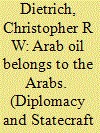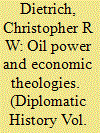| Srl | Item |
| 1 |
ID:
107065


|
|
|
|
|
| Publication |
2011.
|
| Summary/Abstract |
Drawing from material in American and British national archives, the Johnson and Nixon presidential libraries, the archives of the International Monetary Fund, and the United Nations record, this article examines the international politics surrounding the June 1972 nationalisation of the Iraq Petroleum Company. The response to the nationalisation reveals a complex relationship between traditional Cold War concerns and the emergence of a Third World challenge to the structure of the post-war international economy: the practice of raw material sovereignty. Although Soviet aid to the Ba'ath government was central to nationalisation, it was far from exclusive. Accordingly, the nationalisation illustrates the dynamism of the Cold War era and places on display important forces that operated independently of Cold War constraints.
|
|
|
|
|
|
|
|
|
|
|
|
|
|
|
|
| 2 |
ID:
145539


|
|
|
|
|
| Summary/Abstract |
This article holds that Henry Kissinger conducted a free market diplomacy in result to the 1974-1974 energy crisis. That is, he and other decision-makers in the Department of the Treasury, the National Security Council, and the State Department demonized the Organization of Petroleum Exporting Countries as an illiberal bogeyman and made the parallel argument that the free market was the only rational system capable of meeting global economic challenges. The culmination of this policy was the decision in the Ford Administration to subvert the egalitarian and redistributionist arguments of the United Nations’ 1974 Declaration of a New International Economic Order. Kissinger and other policymakers did so through a diplomacy of accommodation, a policy towards Third World demands for a more just international economy that continued into the Carter Administration.
|
|
|
|
|
|
|
|
|
|
|
|
|
|
|
|